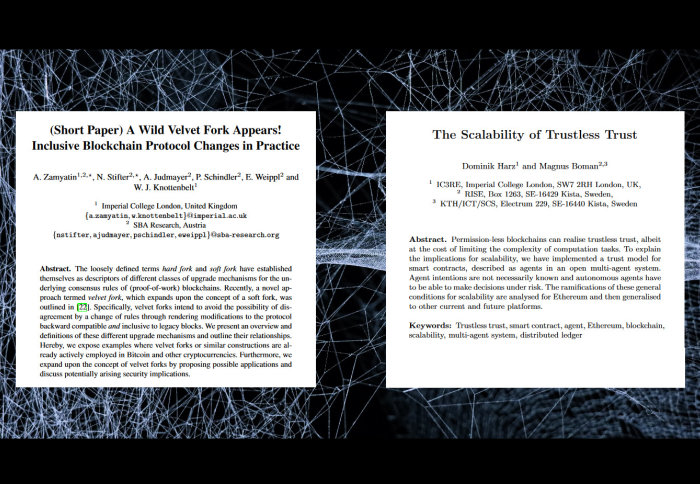Two papers accepted at the Financial Cryptography and Data Security conference
by Sean Conner

Two papers by PhD candidates in the Centre for Cryptocurrency Research and Engineering have been accepted for an upcoming conference.
The two papers, authored by Dominik Harz and Alexei Zamyatin, will feature at the Financial Cryptography and Data Security 2018 conference at the end of the month.
The conference promotes secure transactions and systems by bringing together researchers and industry applications in an international context.
In the past years, the conference has been addressing research related to distributed ledger technologies and cryptocurrencies. As such, the conference hosts several workshops including the Workshop on Bitcoin and Blockchain Research and the Trusted Smart Contracts Workshop.
The Scalability of Trustless Trust
Authors: Dominik Harz (RA and PhD candidate with IC3RE) and Magnus Boman (KTH and RISE SICS) @ Trusted Smart Contracts Workshop. Open access version.
Abstract
Permission-less blockchains can realise trustless trust, albeit at the cost of limiting the complexity of computation tasks. To explain the implications for scalability, we have implemented a trust model for smart contracts, described as agents in an open multi-agent system. Agent intentions are not necessarily known and autonomous agents have to be able to make decisions under risk. The ramifications of these general conditions for scalability are analysed for Ethereum and then generalised to other current and future platforms.
(Short Paper) A Wild Velvet Fork Appears! Inclusive Blockchain Protocol Changes in Practice
Authors:Alexei Zamyatin (RA and PhD candidate with IC3RE), William Knottenbelt (Director of IC3RE) in close cooperation with Nicholas Stfiter, Aljosha Judmayer, Philipp Schindler and Edgar Weippl (all SBA Research) @ Workshop on Bitcoin and Blockchain Research. Open access version.
Abstract
The loosely defined terms hard fork and soft fork have established themselves as descriptors of different classes of upgrade mechanisms for the underlying consensus rules of (proof-of-work) blockchains. Recently, a novel approach termed velvet fork, which expands upon the concept of a soft fork, was outlined. Specifically, velvet forks intend to avoid the possibility of disagreement by a change of rules through rendering modifications to the protocol backward compatible and inclusive to legacy blocks.We present an overview and definitions of these different upgrade mechanisms and outline their relationships. Hereby, we expose examples where velvet forks or similar constructions are already actively employed in Bitcoin and other cryptocurrencies. Furthermore, we expand upon the concept of velvet forks by proposing possible applications and discuss potentially arising security implications.
Article text (excluding photos or graphics) © Imperial College London.
Photos and graphics subject to third party copyright used with permission or © Imperial College London.
Reporter
Sean Conner
Faculty of Natural Sciences